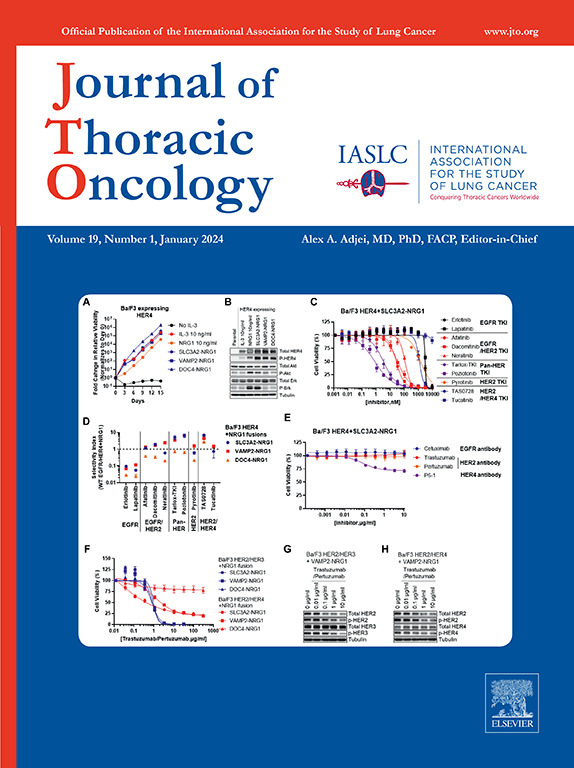区分独立的原发性肺腺癌和肺内转移瘤,重点是病理和分子方面的考虑:IASLC 病理委员会的建议。
IF 21
1区 医学
Q1 ONCOLOGY
引用次数: 0
摘要
导言:随着低剂量计算机断层扫描(LDCT)筛查的实施,多发性肺肿瘤结节(MPTN)的诊断频率越来越高,在临床实践中,选择手术治疗还是全身治疗已成为一项日常挑战。在多发性癌(尤其是腺癌)经病理确定为肺源性时,区分单独的原发性肺癌(SPLC)和肺内转移瘤(IPM)对于分期、管理和预后非常重要:后者包括 DNA 微卫星分析、阵列比较基因组杂交、TP53 和致癌驱动基因突变检测,以及最近颇有成效的由小型或大型多基因组组成的下一代测序(NGS):结果:全面的组织学评估可能足以区分 SPLC 和 IPM。然而,使用大规模 NGS 进行分子图谱分析通常具有更强的鉴别力,可以进行更准确的分类。根据文献综述和专家意见,我们提出了一个综合的四步组织学和分子分类算法,用于解决腺癌组织学中的 MPTN 问题,该算法鼓励采用多学科方法。同样值得注意的是,结合机器学习和数字病理学的新技术未来可能会发展成为区分SPLC和IPM的有价值的诊断工具:尽管组织病理学评估通常足以区分SPLCs和IPMs,但在可能的情况下应进行分子图谱分析,尤其是在肿瘤形态相似的病例中。这篇手稿总结了之前为解决当前挑战所做的努力,并强调了用于将多发性肺腺癌分为SPLCs或IPMs的分化方法和算法的最新进展,这在肺癌精准治疗中正变得越来越关键。本文章由计算机程序翻译,如有差异,请以英文原文为准。

Differentiating Separate Primary Lung Adenocarcinomas From Intrapulmonary Metastases With Emphasis on Pathological and Molecular Considerations: Recommendations From the International Association for the Study of Lung Cancer Pathology Committee
Introduction
With the implementation of low-dose computed tomography screening, multiple pulmonary tumor nodules are diagnosed with increasing frequency and the selection of surgical treatments versus systemic therapies has become challenging on a daily basis in clinical practice. In the presence of multiple carcinomas, especially adenocarcinomas, pathologically determined to be of pulmonary origin, the distinction between separate primary lung carcinomas (SPLCs) and intrapulmonary metastases (IPMs) is important for staging, management, and prognostication.
Methods
We systemically reviewed various means that aid in the differentiation between SPLCs and IPMs explored by histopathologic evaluation and molecular profiling, the latter includes DNA microsatellite analysis, array comparative genomic hybridization, TP53 and oncogenic driver mutation testing and, more recently, with promising effectiveness, next-generation sequencing comprising small- or large-scale multi-gene panels.
Results
Comprehensive histologic evaluation may suffice to differentiate between SPLCs and IPMs. Nevertheless, molecular profiling using larger-scale next-generation sequencing typically provides superior discriminatory power, allowing for more accurate classification. On the basis of the literature review and expert opinions, we proposed a combined four-step histologic and molecular classification algorithm for addressing multiple pulmonary tumor nodules of adenocarcinoma histology that encourages a multidisciplinary approach. It is also noteworthy that new technologies combining machine learning and digital pathology may develop into valuable diagnostic tools for distinguishing SPLCs from IPMs in the future.
Conclusions
Although histopathologic evaluation is often adequate to differentiate SPLCs from IPMs, molecular profiling should be performed when possible, especially in cases with tumors exhibiting similar morphology. This manuscript summarized the previous efforts in resolving the current challenges and highlighted the recent progress in the differentiation methods and algorithms used in categorizing multiple lung adenocarcinomas into SPLCs or IPMs, which are becoming more and more critical in precision lung cancer management.
求助全文
通过发布文献求助,成功后即可免费获取论文全文。
去求助
来源期刊

Journal of Thoracic Oncology
医学-呼吸系统
CiteScore
36.00
自引率
3.90%
发文量
1406
审稿时长
13 days
期刊介绍:
Journal of Thoracic Oncology (JTO), the official journal of the International Association for the Study of Lung Cancer,is the primary educational and informational publication for topics relevant to the prevention, detection, diagnosis, and treatment of all thoracic malignancies.The readship includes epidemiologists, medical oncologists, radiation oncologists, thoracic surgeons, pulmonologists, radiologists, pathologists, nuclear medicine physicians, and research scientists with a special interest in thoracic oncology.
 求助内容:
求助内容: 应助结果提醒方式:
应助结果提醒方式:


